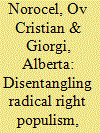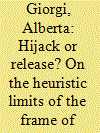|
|
|
Sort Order |
|
|
|
Items / Page
|
|
|
|
|
|
|
| Srl | Item |
| 1 |
ID:
185903


|
|
|
|
|
| Summary/Abstract |
This Special Issue provides diverse multidisciplinary entry points that convey the multi-layered complexity of the interactions between radical right populism, gender issues, and religious questions. It fills a gap in the scholarship dealing with the political and social manifestations of radical right populism. From a theoretical point of view, the connections between radical right populism and gender and between radical right populism and religion, respectively, have received growing scholarly attention. The present Special Issue bridges these separate lines of inquiry, concentrating on how issues of gender and religion are jointly addressed in radical right populist discourses. The articles in this Special Issue provide the first in-depth and comparative understanding of the entanglements of gender and religion in radical right populist ideology, explore the active role of religion in the populist discourse, and invite to combine the analysis of the political sphere with the analysis of occurrences in the broader society.
|
|
|
|
|
|
|
|
|
|
|
|
|
|
|
|
| 2 |
ID:
185907


|
|
|
|
|
| Summary/Abstract |
In the Manichaean discourse of the radical-right populist parties, both religion and gender play a role in the discursive process of ‘othering’. At the same time, on some occasions, populist discourse also mobilises Christianity and gender equality against immigrants, which has been interpreted through the frames of hijacking or instrumentalization. In this paper, I advance two arguments: first, I illustrate the relevance of the literature on secularisation to finetune the analysis of the entanglements of populism, religion and gender, to overcome the ‘hijacking’ frame; second, I make a plea for a socio-constructivist perspective, which pays attention to how the actors make sense of their religious-political engagement and try to avoid paternalistic interpretations. Empirical analysis focuses on the discourse of the supporters of Matteo Salvini, the leader of the Italian radical-right populist party Lega Nord, on Instagram, showing the intersections of religion and gender.
|
|
|
|
|
|
|
|
|
|
|
|
|
|
|
|
|
|
|
|
|